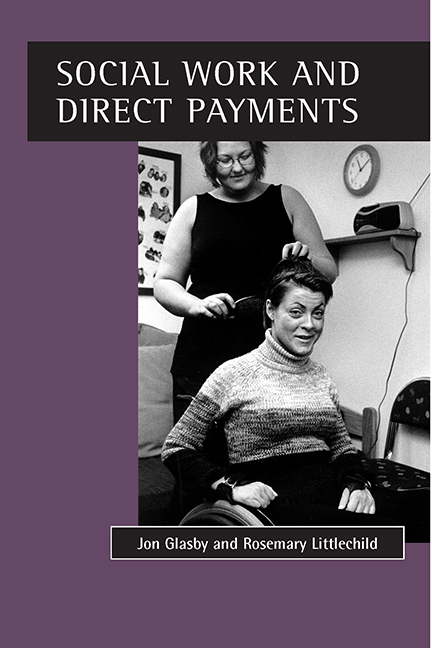Book contents
- Frontmatter
- Contents
- List of tables and boxes
- Foreword
- Acknowledgements
- List of abbreviations
- one Introduction
- two History
- three From indirect to direct payments I: legislation
- four From indirect to direct payments II: guidance and extension
- five The progress of direct payments
- six The experiences of different user groups
- seven The advantages of direct payments
- eight Possible difficulties
- nine Practical issues
- ten Conclusion: implications for community care
- Bibliography
- Appendix Useful resources
- Index
- Related reports from The Policy Press
three - From indirect to direct payments I: legislation
Published online by Cambridge University Press: 05 April 2022
- Frontmatter
- Contents
- List of tables and boxes
- Foreword
- Acknowledgements
- List of abbreviations
- one Introduction
- two History
- three From indirect to direct payments I: legislation
- four From indirect to direct payments II: guidance and extension
- five The progress of direct payments
- six The experiences of different user groups
- seven The advantages of direct payments
- eight Possible difficulties
- nine Practical issues
- ten Conclusion: implications for community care
- Bibliography
- Appendix Useful resources
- Index
- Related reports from The Policy Press
Summary
Despite the growth of the Independent Living Movement and the popularity ofthe ILF, direct payments to individual service users were illegal until thepassage of the 1996 Community Care (Direct Payments) Act. This was theresult of a desire to separate social work from its 19th-century roots (seeChapter Two) and was embodied in three main statutes (Mandelstam, 1999, p232):
• Section 29 of the 1948 National Assistance Act (see Box6);
• Section 45 of the 1968 Health Service and Public HealthAct;
• Schedule 8 of the 1977 National Health Service Act.
Although the 1968 Social Work (Scotland) Act did permit direct payments incertain circumstances, these were heavily prescribed and the power to makesuch payments was rarely used (Zarb and Nadash, 1994; Witcher et al, 2000;see Chapter Five for further details).
Despite these legal obstacles, we have already seen how pressure had begun tobuild for some sort of cash payment to enable disabled people to make theirown care arrangements (Chapter Two). As this pressure continued to mount,key milestones in the eventual introduction of direct payments included:
• the growth of indirect payments in the 1980s and 1990s,whereby disabled people established their own trusts to administercash payments, or where money was paid via third parties;
• thwarted attempts to introduce direct payments in the early1990s;
• the 1996 Community Care (Direct Payments) Act;
• official policy and practice guidance;
• the subsequent extension of direct payments to differentuser groups.
Direct payments prior to 1996
Nothing in the foregoing provisions of this section shall authorise orrequire – a) the payment of money to persons to whom this sectionapplies … [that is to say persons who are blind, deaf or dumb,and other persons who are substantially and permanently handicapped byillness, injury, or congenital deformity.]
(1948 National Assistance Act, section 29)While events leading up to the passage of the 1996 Community Care (DirectPayments) Act are examined in this chapter, official guidance and subsequentdevelopments are explored in Chapter Four.
Indirect payments
As awareness about the potential advantages of enabling disabled people topurchase their own care increased, both service users and local authoritiesbegan to explore methods of circumventing the prohibitions of the NationalAssistance Act.
- Type
- Chapter
- Information
- Social Work and Direct Payments , pp. 19 - 32Publisher: Bristol University PressPrint publication year: 2002



